Environmental Geotechnics

The rising energy demand of the growing world population is a significant cause for environmental risks associated with harmful emissions, hazardous waste, destructive land use, etc. This creates a pressing need to avoid or resolve conflicts between a continuing socio-technical development on the one hand and the preservation of the natural basis of our existence on the other. In order to build an ecologically, economically and socially sustainable future, environmental, climate and energy policies target measures such as the decarbonisation of the energy system, resource efficiency, and sustainability, while maintaining energy security. Achieving these goals entails the growing use of renewable energy sources and highly efficient energy conversion technologies.
Current concepts of future energy systems and infrastructures link natural and technical systems in an interactive manner, making them relevant to the major research fields of Earth & Environment and Energy. There is a strong need for methods and tools to design and assess technological options for future energy systems as well as their environmental impact.
The working area „Environmental Geosystems“ will particularly contribute to Topic 8 “Georesoures for the Energy Transition and a High-Tech Society” within the POF IV Program „Changing Earth – Sustaining our Future“.
It is our mission to provide models and numerical simulation frameworks for the in silico assessment of technologies in the context of transforming and sustainable energy systems. Our particular focus is on the quantification of matter and energy fluxes in those solutions where natural and technical systems meet. Examples for such applications include heat storage and geothermal energy but also the subsurface deposition of waste associated with the energy sector.
Our goal is to develop, implement and apply thermodynamically consistent numerical models for the engineering analysis of multiphysical processes in complex natural and technical energy systems. Our core expertise is the modelling of strongly coupled processes entailing thermal, hydraulic, mechanical, and chemical (THMC) processes. We develop models based on a set of general continuum physical principles in order to maintain their flexibility for a wide range of applications.
The Environmental Geotechnics (ENVGEO) group of UFZ and TUBAF is working the fields of continuum and fracture mechanics.
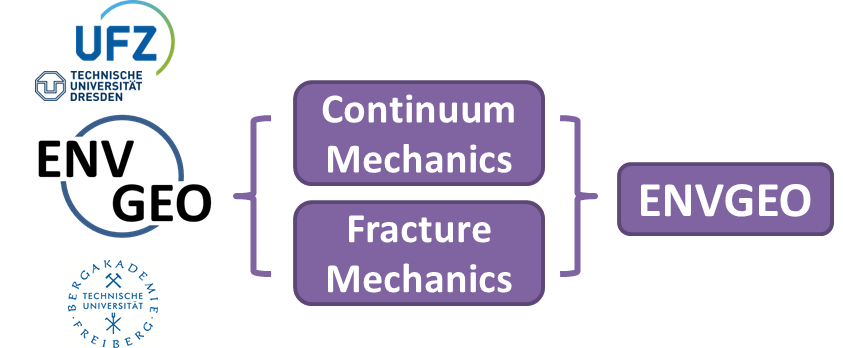
The following topics and projects are currently being pursued in collaboration with partners from universities, research institutes, and SMEs.
- Benchmarking THM models for various rock types and at different scales in an international model and code comparison project (DECOVALEX 2019), shaping the new phase THMC benchmarking activities (DECOVALEX 2023).
- Actively participating and shaping the European flagship project for nuclear waste research (EURAD) taking leading roles in workpackages ACED, DONUT, and GAS.
- Modelling supercritical geothermal systems and investigating potential mechanisms for induced seismicity (GeMEX).
- Developing experimental and numerical platforms for the analysis of the formation and development of discontinuities in geological barriers in salt, clay and crystalline rocks (GeomInt).
- Modelling and simulation of potential storage material infiltration and hydrogen permeation at the cavern contour in the context of subsurface hydrogen storage (H2-UGS).
- Development of simulation methods and platforms aimed at the envisioned cross-scale system understanding of the different interacting repository compartments (iCROSS).
- Investigating effects of changing boundary conditions on the development of hydrogeological systems: Numerical long-term modelling considering thermal-hydraulic-mechanical (-chemical) coupled effects
- Development of an open-source Synthesis-Platform based on OpenGeoSys for supporting the siting process for a deep geological repository
See also related projects.
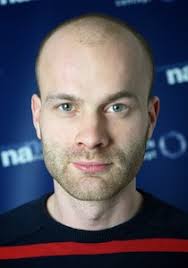 Jörg Buchwald
Jörg Buchwald
Dr. Jörg Buchwald studied physics at the University of Leipzig and got his diploma in 2011 on "Simulation of seismic waves and time reversal in continuous random media". In July 2011 he joined the group of Prof. Mayr at the Leibniz-Institute of Surface Engineering, where he wrote his PhD thesis on "Modeling nanomechanical properties at surfaces". 2016-2018 he worked on multiscale modeling of ion-sensitive FET devices at the chair of Materials Science and Nanotechnology at Dresden University of Technology. In March 2019 Dr. Buchwald joined the UFZ to work on uncertainty modeling of coupled THM processes in radioactive waste repositories within the iCross project in collaboration with the Chair of Soil Mechanics and Foundation Engineering at the TU Bergakademie Freiberg. Since April 2022 he is continuing his work on Python workflows for OGS within the BGE-funded OpenWorkFlow project.
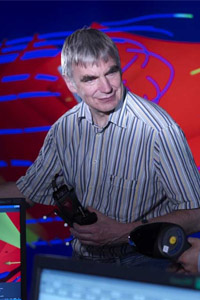 Uwe-Jens Görke
Uwe-Jens Görke
Dr. Uwe-Jens Görke has been a staff member of the Department of Environmental Informatics since 2008. He studied Theoretical Mechanics and Applied Mathematics at the University of Kharkov, and holds a PhD in Solid Mechanics. From 1996-2008 he worked at Chemnitz University of Technology. His research interests are related to numerical methods and constitutive modelling with applications in geo-technologies, particularly focused on energy related topics, like geothermal energy, energy storage and carbon dioxide storage. Dr. Görke coordinates work packages of different national research projects and is involved in managing projects during all project stages--from the application for funds to final reporting.
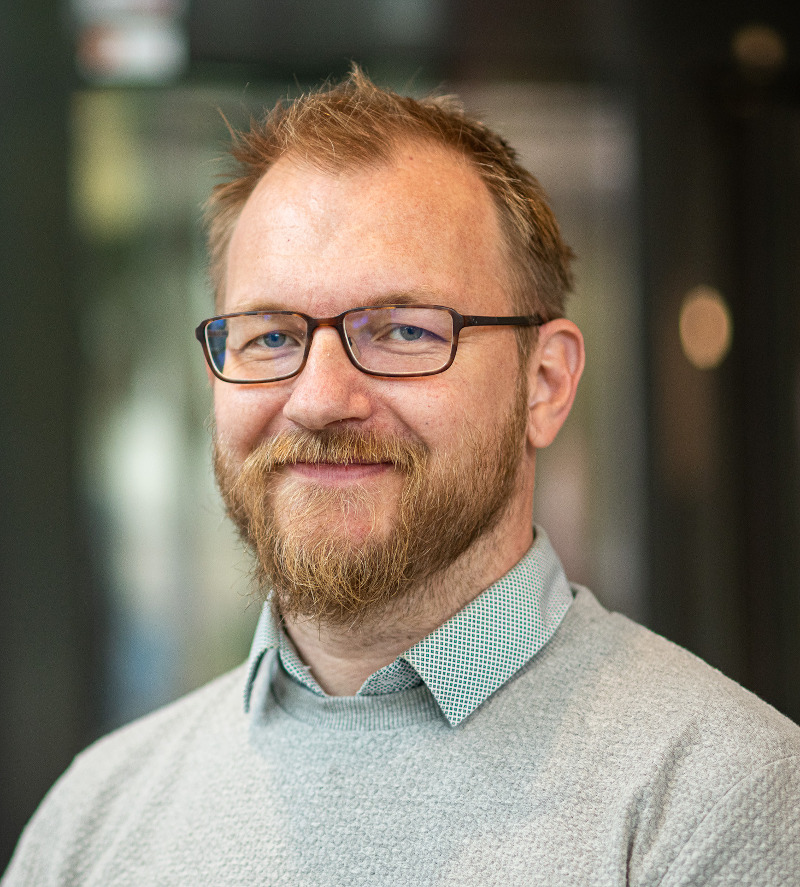 Norbert Grunwald (né Böttcher)
Norbert Grunwald (né Böttcher)
Dr. Norbert Grunwald is currently a scientist at the Helmholtz Centre for Environmental Research - UFZ in Leipzig and a visiting scientist at the Technische Universität Bergakademie Freiberg. Previously, he was a research associate at the Federal Institute for Geosciences in Hanover, investigating the thermodynamic and mechanical effects of large-scale CO2 storage on saline groundwater systems. After graduating with a Diploma in Water Supply Management and Engineering in 2007, Dr Grunwald worked at the Institute of Groundwater Management at the Technical University of Dresden as a lecturer and research assistant. He received his PhD for the development of a mathematical model for the simulation of non-isothermal, compressible multiphase flow processes in the context of enhanced gas recovery. In his current research project, Dr Grunwald is working on the disposal of radioactive waste. His research focuses on model development and simulation of coupled multiphase flow and mechanical deformation.
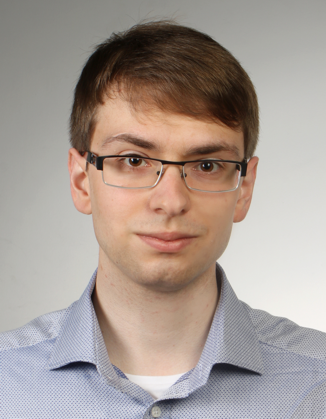 Feliks Kiszkurno
Feliks Kiszkurno
Feliks Kiszkurno obtained his Bachelor of Science in Geosciences from University of Bremen and Master of Science in Applied Geophysics from IDEA League (TU Delft, ETH Zürich, RWTH Aachen). He is working on his PhD at UFZ on uncertainty quantification in THM-processes as part of URS (Uncertainties and Robustness with regard to the Safety of a repository for high-level radioactive waste) project (MeQUR subproject). The application of his project is directed at safety of nuclear waste repositories.
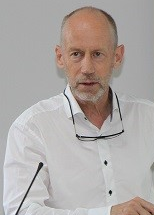 Olaf Kolditz
Olaf Kolditz
Olaf is heading the Department of Environmental Informatics at UFZ (ENVINF) and is Full Professor for Applied Environmental Systems Analysis at Technische Universität Dresden. He is coordinating the research projects in environmental geosciences at ENVINF and is PI of Topic 8 (Georesources - energy and raw materials for the future) in the Helholtz Research Program (POF IV). Olaf is Editor-in-Chief of the Environmental Earth Sciences journal.
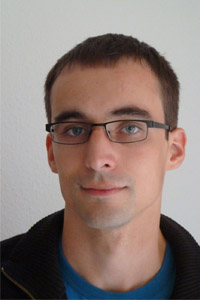 Christoph Lehmann
Christoph Lehmann
Dr. Christoph Lehmann obtained his Bachelor's degree in Physics from the Martin Luther University Halle-Wittenberg in 2011 and his Master's in Physics from the University of Leipzig in 2013. He's been working as a software developer at pwp-systems developing tools for traffic data analysis from 2011-2015. After working on scientific visualisation at the Institute of Computer Science at Leipzig University, he joined the UFZ in 2015 to work on the numerical simulation of thermochemical energy storage (TCES), especially systems based on water adsorption to zeolite. His research interests are the numerical assessment of the energy efficiency of those storage systems and the examination of the coupling between electric and thermal fields during sorption processes in zeolites, particularly regarding dielectric heating phenomena.
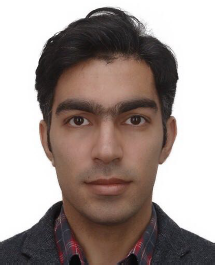 Mostafa Mollaali
Mostafa Mollaali
Dr. Mostafa Mollaali received his bachelor's degree in civil engineering in 2007 and his master's degree in geotechnical engineering in 2011. From 2011 to 2014, he worked in geotechnical engineering communities before starting his Ph.D. studies at Shanghai Jiao Tong University. In March 2019, he obtained his Ph.D. in mechanical engineering; his research focuses on numerical modeling of hydraulic and carbon dioxide fracturing. He started his postdoctoral research at Shanghai Jiaotong University in October 2019. In July 2020, he joined Helmholtz Centre for Environmental Research-UFZ. His research interests include thermo-hydro-mechanical coupled modeling, hydraulic fracturing, phase field approach for fracture, rock mechanics, and numerical modeling.
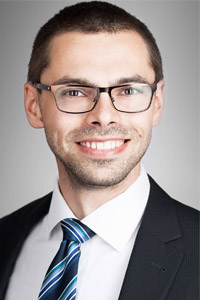 Thomas Nagel
Thomas Nagel
Thomas Nagel is a Full Professor, Chair of Soil Mechanics and Foundation Engineering Technische Universität Bergakademie Freiberg, Germany.He formerly headed the groups "Computational Energy Systems" at the Helmholtz Centre for Environmental Research - UFZ, as well as "Environmental Geotechnics: Multi-physics simulation for geotechnical system analysis", a joint work group between the UFZ and the Federal Institute for Geosciences and Natural Resources (BGR). He holds an Adjunct Professorship at Trinity College Dublin, Ireland, and his main research interests are continuum mechanics and multiphysical processes in porous media for applications in energy, geotechnics and biology. During his Master's studies of Mechanical Engineering/Applied Mechanics at Chemnitz University of Technology, he discovered his fascination for coupled problems during several research stays at Rush University Medical Center in Chicago and Eindhoven University of Technology, the Netherlands, where he studied the biomechanical and tribological properties of osteochondral transplants and artificial intervertebral discs as well as the causes of deep tissue injury in skeletal muscle tissue. In 2012 he was awarded his PhD from Trinity College Dublin, Ireland, for a dissertation on the role of mechanical cues in regenerating and engineered skeletal tissues. Since then he has been working at the UFZ as part of a team of scientists developing the numerical simulation framework OpenGeoSys for coupled multiphysical problems. His particular foci are thermochemical heat storage, sensible heat storage in porous media and geotechnical applications in the context of energy supply, storage and waste management.
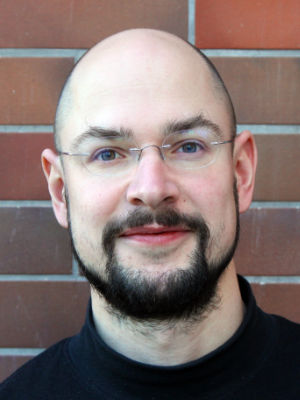 Dmitri Naumov
Dmitri Naumov
Dr. Dmitri Naumov joined the Department of Environmental Informatics in 2011 as a PhD student. After finishing his thesis 2015 on computational fluid dynamics in unconsolidated sediments he focused on development of the OpenGeoSys FEM software.
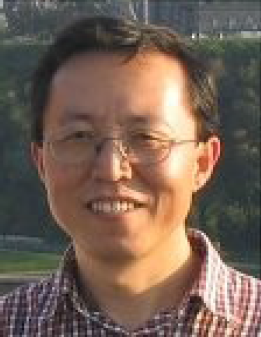 Wenqing Wang
Wenqing Wang
Dr. Wenqing Wang received a PhD in computational mechanics from Tongji University, Shanghai, China, 1997. During his PhD, he studied in Shinshu University, Shinshu, Japan for one year supported by an international student exchange program. He joined the development of OGS in 2002 at Center for Applied Geoscience (ZAG), University of Tuebingen, and worked at the ZAG until 2007. In 2007, he joined the UFZ. His research interests include environmental and geotechnical modelling, high performance computing and object-oriented programming for scientific computing. His publications and research interests can be found in his ORCID record: https://orcid.org/0000-0001-8909-6245.
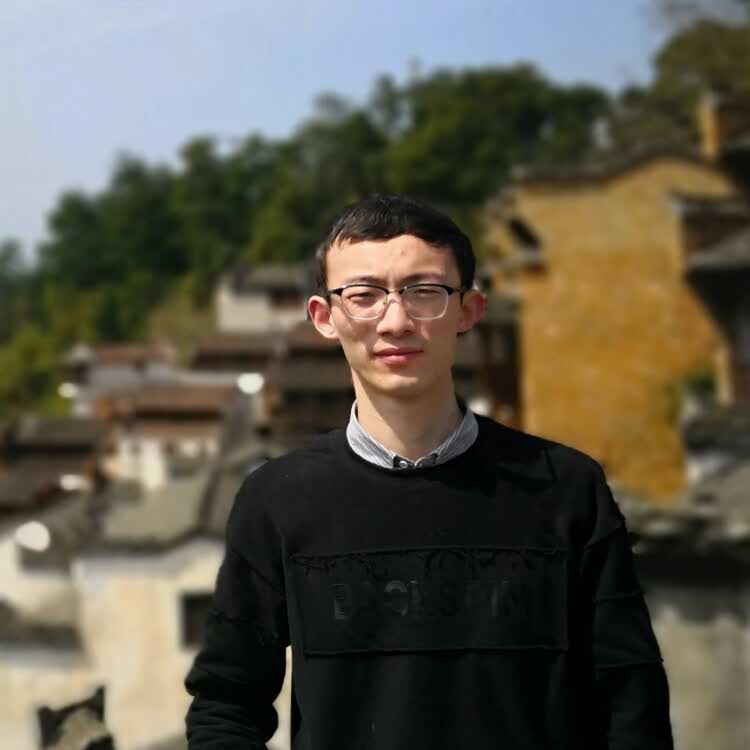 Tao You
Tao You
Dr. Tao You received his PhD degree in Geotechnical Engineering from Hohai University, China, 2021. He was a one-year research scholar in Columbia University, USA, 2019-2020, with focusing on Computational Mechanics. Since Dec. 2021, he started working as a PostDoc at the UFZ funded by the “Helmholtz-OCPC Postdoc-Fellowship”. His research focuses on Rock Mechanics, in particular, on advanced numerical methods in the modelling of rock damage, plasticity and fracture under multi-physics field coupling.
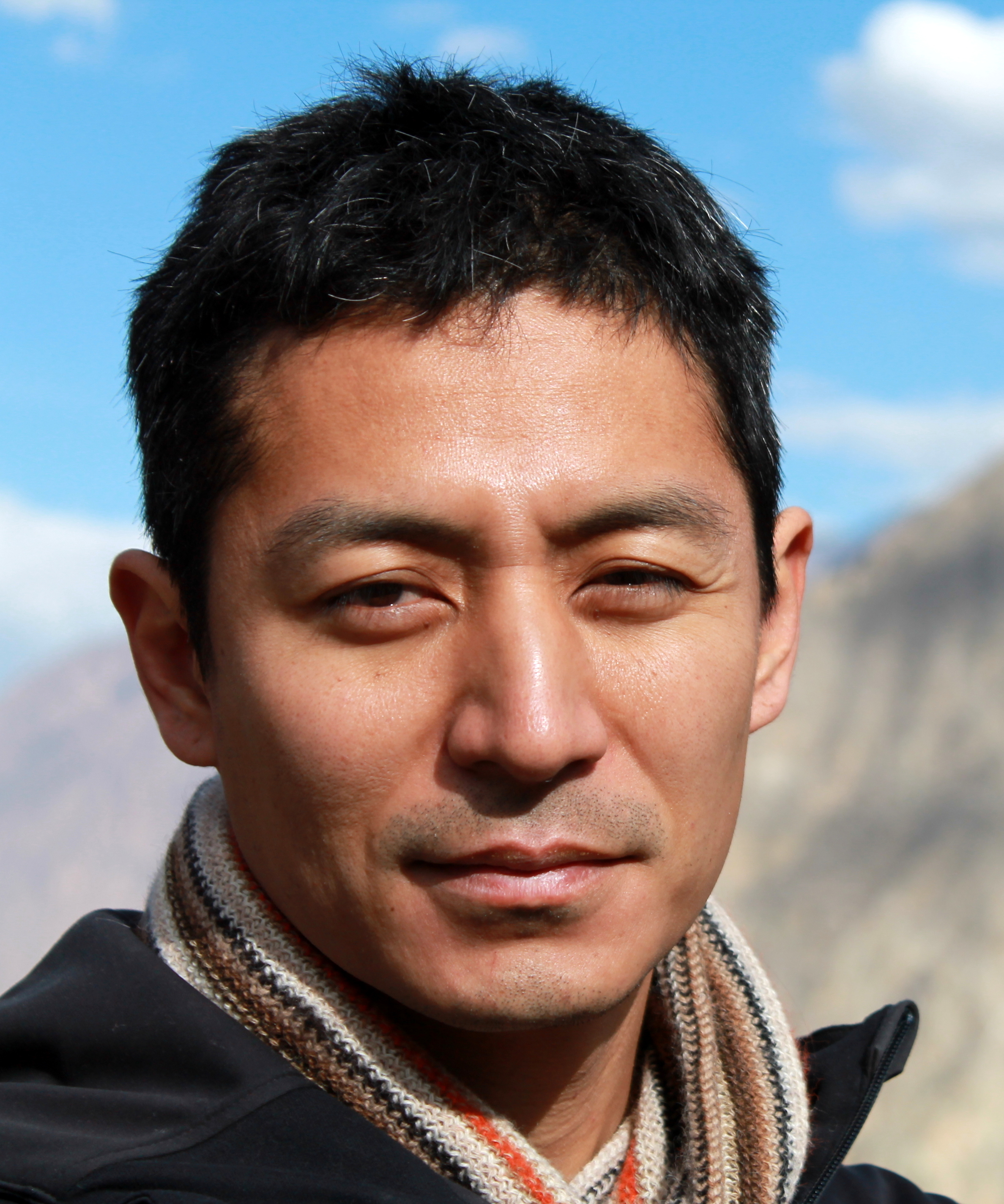 Keita Yoshioka (Group leader fracture mechanics)
Keita Yoshioka (Group leader fracture mechanics)
Dr. Yoshioka joined UFZ in October 2017 to work on computation of fracturing induced by hydraulic and thermal impacts undertaking in subsurface. He received his Bachelor of Science in Resources and Environmental Engineering from Waseda University at Tokyo, Japan in 2003 and PhD in Petroleum Engineering from Texas A&M University at College Station, USA in 2007. From 2007 to 2017, Dr. Yoshioka worked for Chevron at their technology center in Houston conducting internal consulting and corporate R&D on various geomechanical problems including a short assignment to Chevron Geothermal in Jakarta, Indonesia in 2008.
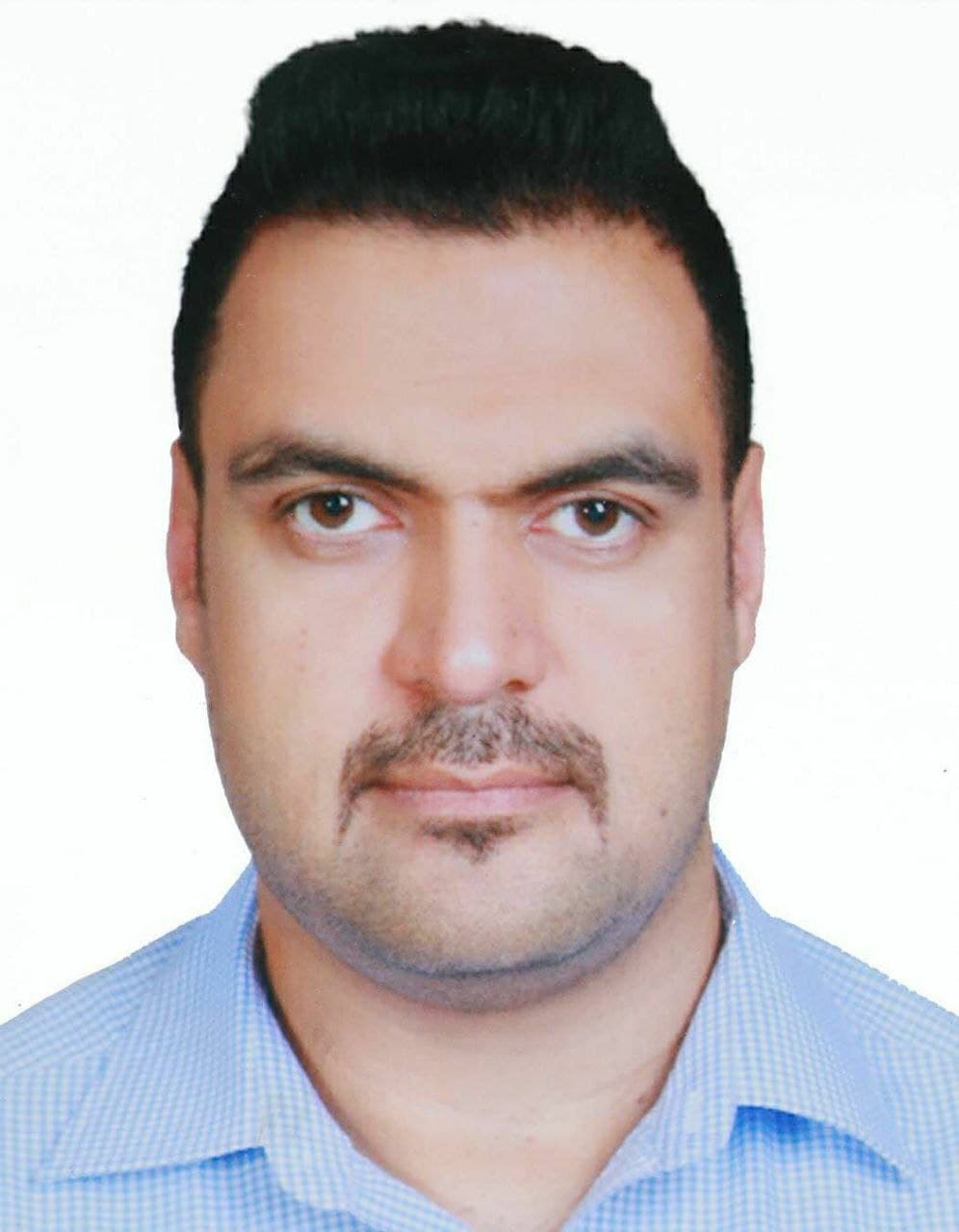 Vahid Ziaei Rad
Vahid Ziaei Rad
Dr. Vahid Ziaei-Rad is currently a scientist at the Helmholtz Centre for Environmental Research - UFZ in Leipzig. He received his PhD degree in Civil Engineering from Universitat Politecnica de Catalunya, Spain, 2016. His man focus is on computational fracture mechanics and computational material science. His area of interests include numerical methods for hydraulic fracturing, phase field approaches to fracture, parallel programming, and model development for fracturing.
 Florian Zill
Florian Zill
Florian Zill was a student at the University of Applied Sciences HTWK Leipzig from 2012 to 2017 and obtained his Bachelor’s and Master’s degree in mechanical engineering and was as a scientific assistant at the Fraunhofer Center for Silicon Photovoltaics CSP during his studies. After his graduation he worked at the Fraunhofer Institute for Microstructure of Materials and Systems IMWS in the group water electrolysis for different HYPOS projects. He joined the Department of Environmental Informatics in 2019 as a PhD student at the TU Bergakademie Freiberg and focuses his work on developing new models for percolation processes in salt rock and their implementation in OGS-6.
Alumnis
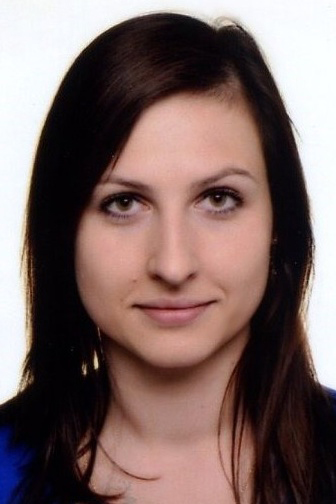 Lucie Ruppenthalová
Lucie Ruppenthalová
Dr. Lucie Ruppenthalová is currently working as a researcher at the Institute of Geonics at the Czech Academy of Science at the Department of Laboratory Research on Geomaterials and guest scientist at the UFZ. She obtained a Master´s degree from Physical Chemistry of Surfaces at the University of Ostrava and Ph.D. degree from the Chemical Metallurgy at the VŠB – TUO Ostrava in the Czech Republic. Her current work is focused on the surface properties of geomaterials, especially specific surface area and pore distribution by gas adsorption methods.
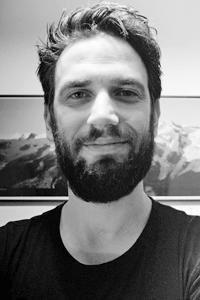 Francesco Parisio
Francesco Parisio
Dr. Francesco Parisio obtained his Bachelor of Science and Master of Science in Civil Engineering from Politecnico di Torino in 2009 and 2011, respectively. After a short period in industry, he was enrolled as a PhD student at the Laboratory of Soil Mechanics of the Swiss Federal Institute of Technology (EPFL). In 2016 he obtained the PhD title in Geomechanics for a dissertation on the constitutive and numerical modeling of shales. He joined the Department of Environmental Informatics at the UFZ in 2017, where he currently works on the development of OGS-6. His research topics include geomechanics, computational mechanics and multiphysics couplings.
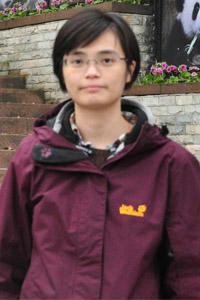 Dr. Xing-Yuan Miao
Dr. Xing-Yuan Miao
Dr. Xing-Yuan Miao received her Bachelor's degree in Inorganic Materials Engineering from Chongqing University, China, in 2009. She then went to Huazhong University of Science and Technology in Wuhan where she obtained a Master's degree in Structural Engineering in 2010 and a PhD in Solid Mechanics in 2014. She joined the UFZ in 2015 where she has been working on the IGLU project. Her research interests are solid mechanics, electromechanics and thermomechanics.
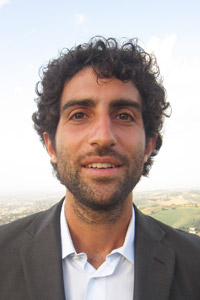 Simone Semprini
Simone Semprini
Simone Semprini obtained his Bachelor’s and a Master’s degree in Energy Engineering from the University of Bologna, Italy, in 2011 and 2014, respectively. After a period in industry, in 2016, he joined the company Solar and Heat Technology Stuttgart, a spin-off of the University of Stuttgart, closely cooperating with the Institute of Thermodynamics and Thermal Engineering (ITW). In 2017, he joined the UFZ as a visiting scientist, collaborating with the group of Computational Energy Systems. His work focuses on numerical modelling of thermochemical energy storage with sorption processes.
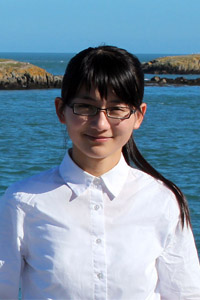 Dr. Lin Zhang
Dr. Lin Zhang
Dr. Lin Zhang is currently enrolled in PhD studies in Geotechnical Engineering in the Department of Civil, Structural and Environmental Engineering at Trinity College Dublin. She obtained a Master's degree from the same institution in 2012 and a Bachelor's degree in Water Conservancy and Hydropower Engineering at Wuhan University, China in 2009. Her current work focuses on thermodynamically consistent constitutive modelling of peat soils. Within this framework, large strain, rate-dependency and structural anisotropy of peat compression are modelled under three-dimensional conditions. She performs the modelling work in collaboration with the group Computational Energy Systems at the UFZ.
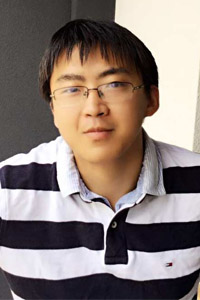 Dr. Tianyuan Zheng
Dr. Tianyuan Zheng
Dr. Tianyuan Zheng was awarded a Bachelor's degree from the Ocean University of China in 2011, and a Master's degree from Stuttgart University in Germany in 2014. He joined the UFZ in October 2014 and is currently working on the numerical modelling of thermo-hydro-mechanical processes in freezing porous media with applications to ground source heat pump systems. His interest is the study of the influence of freeze-thaw processes on borehole heat exchangers with respect to thermal efficiency and deformation. Tianyuan is also involved in Environmental Informatics' workgroup "Geothermal Systems Analysis".
